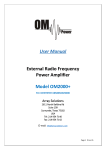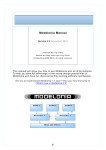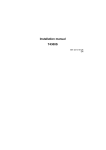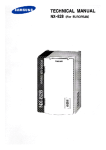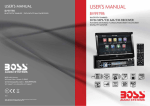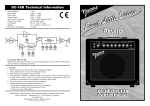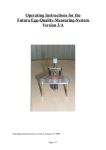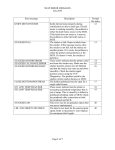Download OM1002+ - OM Power
Transcript
OM1002+ SOLID STATE 145 MHz POWER AMPLIFIER User Manual OM POWER, s. r. o. 930 30 Báč 126 SLOVAKIA E-mail : [email protected] WEB : WWW.OM-POWER.COM Thank you for purchasing a new model of the power amplifier for the 2m amateur band. Parameters, the quality of design and functionality meet the requirements of the market and are the result of our own development. This product is covered by 3 years of warranty period. We wish you many years trouble-free use of this equipment, lot of fun and successful connections in the world of amateur radio. OM POWER Team 2 TABLE OF CONTENTS 1. GENERAL INFORMATION 1.1. Introduction 1.2. Specification 1.2.1. Parameters 1.2.2. Protection Circuits 6 6 6 6 8 2. SAFETY INSTRUCTIONS 9 3. GENERAL DESCRIPTION 3.1. Front and Rear Panel 3.2. HF Part 3.3. Power Supply 3.4. Safety Devices 11 11 14 15 17 4. INSTALLATION 4.1. Grounding 4.2. Coaxial Cable 18 18 19 3 4.3. Control Cable 4.4. Main Supply 4.5. Cooling 19 20 21 5. OPERATION 5.1. Operation Elements 5.2. Preparing for Use 5.3. Setup Menu 5.3.1. Language selection 5.3.2. Display contrast 5.3.3. Display delay 5.3.4. Bias switch 5.3.5. Preamplifier delay 5.3.6. Bias current 5.4. Operating Mode 22 23 24 25 26 26 27 27 28 29 30 6. MAINTENANCE 6.1. Fault conditions 35 35 4 6.2. Fuses 6.3. Cleaning 38 39 7. Block Diagram 8. Timing 40 41 5 1. General Information 1.1. Introduction The OM Power model OM1002+ is a single band, solid state amplifier, designed for duty operation on 2 meter’s amateur band with all modes and no time limit. It is equipped with a new Freescale high rugged Nchannel double MOSFET. This amplifier is characterized by compact design, small size and a low weight. 1.2. 1.2.1. Specification Parameters Frequency Coverage 144 – 148 MHz Amateur Band Power Output 1000W in CW 800W in SSB (linearity), RTTY, AM, FM and digi modes, 50% duty cycle Input Power 10 to 15 W for full output power 1000W Input Impedance 50 Ohm, VSWR < 1.3 : 1 6 Power Gain Typically 19 dB Output impedance 50 Ohm unbalanced Maximum output SWR 1,9 : 1 for full output power 1000W SWR protection: Automatic switching to STBY , when reflected power is 100W or higher Intermodulation distortion - 32 dBc Suppression of harmonics < -70 dBc MOSFET MRFE6VP61K25HR6 Cooler 1 axial fan (cooler) + 1 axial fan (power supply) Supplying 100 – 250VAC , 50 – 60 Hz Power Supplies inside 50V DC switching mode PS 12V DC for logic and protection circuits Size 318 mm x 144 mm x 362 mm [12.5” x 5.7” x 14.3”] (Width x height x depth) Weight 9.5 kg ( 20.9 lb ) 7 1.2.2. Protection Circuits There is several special protection circuits used in the amplifier. They are activated when one or more of next parameters exceed defined values or some unwanted occasion occurs. Output power too high Reflected power too high Drain current too high VSWR too high DC voltage too low or DC voltage error Input power too high (hardware protection & software protection) Inside temperature too high Soft start for power supply protection (PS feature) 8 2. Safety Instructions WARNING! Before you will start to install and operate power amplifier, read carefully next safety instructions! WARNING! AVOID CHILDREN to play around PA or to touch power amplifier or connected cables in working condition, or to push anything into the holes! WARNING! Never turn the amplifier on without the upper lid in place. WARNING! The OM1002+ amplifier is neither to be used in a WET or HUMID environment nor to be exposed to RAINFALL! WARNING! Do not turn the amplifier on without having connected the ANTENNA or properly rated DUMMY LOAD! A hazardous HF voltage may build up on the antenna connector after turning the amplifier on with no antenna or dummy load connected! WARNING! Before opening the upper lid of the amplifier make sure that power supply has been disconnected. Take out power cord from the outlet! 9 CAUTION! The amplifier must be installed in such a way that free flow of hot air from inside is allowed. The amplifier must not be installed in a constrained surrounding (i.e. tight shelves etc.) CAUTION! The amplifier must be properly grounded during operation. CAUTION! During operation the amplifier must be installed in such a way that the rear panel will stay accessible. CAUTION! The amplifier is an A category product. In a household it can influence other electric appliances. In such cases the user is to take proper actions to mitigate this disturbance. CAUTION! Read this manual carefully. Follow all of instructions during installation and operation to avoid damage to the amplifier not covered by manufacturer’s warranty! Do not attempt to perform any change of hardware or software! 10 3. General description 3.1. Front and Rear Panel Main switch (green) on the right side and OLED display are visible on the front panel. After switch PA ON, the display lights up in couple of seconds and shows the controls and indicators. 11 RF Output Mains Plug See Note Power Supply RF Input Grounding Point Cooler inside 12 LAN PREAMP - Local Area Network connection for REMOTE CONTROL of PA (for future use) - RCA Phono, +12V / 100mA for an external RX preamplifier switching CAUTION If you are using an older transceiver or transmitters without time delay, we recommend to connect the PA in such a way that the transmit/receive switch (foot switch for example) is connected with the KEY IN socket of the amplifier. The KEY OUT socket is to be connected with the PTT socket in the transceiver. The amplifier is equipped with two safety devices, which ensure that the output relay is not switched under power mistakenly (hot switching). KEY IN - RCA Phono – Input signal PTT (switching voltage / current 5V /2 mA) KEY OUT - RCA Phono – Output signal PTT (maximum switching of 50V / 100mA) Note: Option. Two SMA connectors for distribution of transmitter and receiver path with local RX preamplifier connection possibility. Internal circuit ensure cold switching. 13 3.2. HF part OM1002+ power amplifier was designed to achieve the RF performance of the MOSFET, when applied to the 144 – 148 MHz frequency band. Design was tuned for performance at 1000W CW output, 50VDC. It consists of „no tune“ distributed element matching circuits designed to be as small as possible. For operating it is important that adequate heat sinking was provided in the design. RF board is the most important part of the PA. Freescale MOSFET is in use. 14 The coaxial transformer turns ratio was chosen to meet required impedance level and the length of the coax was tuned to achieve maximum efficiency and maximum power transfer between the device and its load impedance. Low Pass Filter is installed behind the amplifier to attenuate harmonics. 3.3. Power Supply The amplifier uses two power supplies. A professional switching mode power supply 50V / 50A for power amplifier, and small 12V power supply for logic and protection circuits. 15 Main power supply contains special soft start circuits, uses its own fan, which is visible from the rear side of the PA. It has its own overloading protection and logic to control fan speed. Power amplifier should be connected to any external source of AC in the range from 100 VAC to 277 VAC, from 45 to 60 Hz. It can be powered by a portable generator, for example. Small Power Supply for logic and protection circuits. This PS is using for an external preamplifier, too. Current consumption of external preamplifier is limited to 100mA. It is powered from the main power supply. 16 3.4. Safety Devices Control and monitoring circuits ensure control and safety during malfunctions of the PA. These are on the Control board and the Protection board. Control board is located behind the front panel. Protection board is visible on the right hand side of PA, close to the input/output relay. Protection board with Input circuits. Input RF attenuator (6 dB) is visible in the picture. Some of protection circuits are installed on the Control board (behind the front panel), too. 17 4. Installation NOTE Read this chapter carefully prior starting with installation. Before unpacking inspect shipping carton first, if it is not damaged. Keep all of packing parts for possible future shipment. Check unpacked power amplifier. If you find some damaging, contact your dealer immediately to keep full warranty. During installation go step by step according to next parts. 4.1. Grounding CAUTION The amplifier has to be grounded properly! Connect the screw on the rear panel of the amplifier to your local grounding system with a copper cable; use a cross-section of 4 mm2 at least. 18 Connect your transceiver to the same grounding system of your shack carefully! Use minimum length of cables and make sure that the connections are both physically and electrically sound. With poor grounding, you may risk damaging to your equipment, having problems with TVI/BCI or your transmitted signal may be distorted. 4.2. Coaxial Cable The output of the transceiver is to be connected to the input of the amplifier via RG58 or similar cable. For the connection between the power amplifier and the antenna, Belden 9913 or similar coaxial cable suited for high power is recommended. Both the INPUT and OUTPUT N sockets with Teflon insulation are used. 4.3. Control Cable Control cable maintains TX / RX switching of the PA (TX GND). The cable must be shielded. On the side of the power amplifier a CINCH-socket is used. On the side of your transceiver you have to use a socket suitable for this transceiver. During transmitting the middle pin is connected to the ground. 19 Amplifier uses one coaxial relay for the output. It has to be switched earlier than HF is applied (cold switching). Modern transceivers they have a time delay between PTT switching and power output. Sufficiently robust coaxial relay is using for TX/RX switching. 4.4. Main Supply CAUTION Be sure you got PA with properly terminated line cable, corresponding with your power system’s outlet. If not, contact your dealer. In such a case you should make the necessary changes using a licensed electrician. 20 CAUTION Be sure that your power system is correctly wired and properly rated! To use adequately sized and connected grounding system is also very important. 4.5. Cooling CAUTION The amplifier must be installed in such a way that free flow of hot air from the amplifier is allowed. Do not obstruct air intake and exhaust areas of the PA. Installed axial fan provides adequate cooling of the amplifier, even during long time operation. It is automatically activated when PA is switching ON. There are two modes of fan speed selectable. In the normal mode fan speed is gradually rising with increasing temperature. In the contest mode the fan is switched at a constant high speed. Fan inside the power supply starts to operate depending on the current drawn by the MOSFET. When the amplifier reaches inside temperature of 75 deg. Celsius, warning appears and fault LED starts blinking. At 80 degrees transmitting will be automatically blocked, fault LED will light. 21 5. Operation WARNING! Before switching PA on, make sure that amplifier is grounded, antenna or dummy load is connected, and power cord is putted to the outlet. CAUTION Do not turn PA on for at least 2 hours after unpacking it and moving in its operating location. Especially when amplifier was moved from a cold place to a warm one, because not visible condensation may develop inside, and this could result in damage of the PA. CAUTION Before switching PA on, check connections between PA and TCVR. Never try to change antenna during a transmission to avoid warranty loss. 22 5.1. Operation Elements After switch PA ON (green switch on the front panel) main supply will be activated, the touchscreen lights up and shows the controls and indicators. They are very intuitive. There are 4 yellow touch buttons visible on the screen. Above the first three buttons (from the left side) their status should be displayed. Touch of a button will change the operation status. LED above the status line will lights. SETUP touch button is used to set some parameters. 23 Contest fan speed is selected 5.2. PA is in the operation mode External preamplifier is ON Preparing for use After turning on the power switch on the front panel power amplifier will automatically go into standby mode. We recommend to start preparation for operation with SETUP menu. Firstly it allows you to set the language, then to set some of the basic parameters. Possible languages: English, German, Slovak, Hungarian and French. 24 5.3. Setup Menu Touch SETUP on the screen. Setup menu is displayed. Touch LANG. 25 5.3.1. Language selection The language selection screen is displayed. Touch on the corresponding flag to select language. Screen will go automatically back to the Setup Menu. Or, if you do not want to change language, touch BACK. 5.3.2. Display contrast Touch CONT from Setup screen. Use UP/DOWN to set contrast of the touchscreen. Then touch SAVE. Screen will go automatically back to the Setup Menu. Or, if you do not want to change contrast, touch BACK. 26 5.3.3. Display delay Display will not turns OFF Display turns OFF after 10 sec. Display turns OFF after 1 min (max.) 5.3.4. Bias switch Electronic Bias Settings (EBS) is one of significant feature of the power amplifier. It allows to set low drain current (abt. 300mA) after pressing the PTT, until RF signal is no present at the input. At the moment when RF signal comes to the input of the PA, bias will automatically change its value to the higher level (abt. 2.5A), independently on the selected operation mode in the TCVR....... EBS is default activated. 27 To deactivate EBS you have to set Bias switch to OFF. I such a case bias value immediately after pressing the PTT will be high. Touch BIAS from the Setup screen. Use ON/OFF to set bias working condition. Then touch BACK. Screen will go automatically back to the Setup Menu. 5.3.5. Preamplifier delay You can control switching of an external (remote) RX preamplifier from the PA using PREAMP ON/OFF touch button. For reliable working condition and safety of preamplifier there is important to set some delay of its switching according to the PTT. Possible range is from 0 to 200ms. Default value is 20 ms. 28 Touch PREAM from Setup screen. Use UP/DOWN to set delay value (0200ms). Then touch SAVE. Screen will go automatically back to the Setup Menu. Or, if you do not want to change delay, touch BACK. 5.3.6. Bias current Touch CURR to see both levels of bias current. In couple of seconds you will see the values of drain current in the both lines. This parameter will be checked without the possibility to change it. Use BACK touch button to release checking. Fluctuation of values is not a mistake. To release the Setup menu touch BACK again. 29 5.4. Operating mode CAUTION In STBY the amplifier is in bypass-mode and your transceiver is directly connected to the antenna. Maximum allowed power in bypass mode is 100 Watts! Passing RF power is not measured and displayed if PA is either in standby mode or turned OFF. Touch the OP/STBY button to activate operating mode. In the OPERATE mode you can select fan speed, switching an external RX preamplifier ON or OFF, but it is not possible to go to the Setup menu. WARNING! Before you push PTT for the first time, set the RF power in your TCVRr to the minimum (from 3 to 5 watts) !!! 30 Set OPERATE mode, type of operation and press PTT. You can check measured parameters of PA. Picture shows input power of 4.7 W, output power 516 W. Power gain from input to output of the PA is 20.4 dB. You can also read other important parameters on the display – MOSFET voltage, MOSFET current, reflected power, SWR and temperature. Depending on the reflected power you can consider quality of your antenna (impedance matching). 31 With only 0.4 W of the input power you can reach more than 100W at the output. Power gain is 24.1 dB. Another example shows picture with 1.8 W of the input power. In this case power gain is 21.6 dB With 1.8W of the input power you can get more than 260W of the power output. 32 If all looks ok, you can increase RF power from the transceiver slowly and check important parameters of the PA. Do not exceed the output power of 1000 watts in CW operation mode and about 800 watts in SSB, AM, FM and digi operation mode even if more is reachable. NOTE We recommend using the maximum output power of 800 watts to maintain good linearity of output signal in SSB or AM mode. CAUTION Check the temperature of PA during digi modes operation. Decrease the output power, when warning „Temp“ (under the FAULT LED) appears. Output power of about 800 watts should be ok for 50% of duty cycle. 33 If something happened with PA loading (for example), protection circuit detects increasing of VSWR (reflected power). If this parameter exceed the limit value, fault condition appears and PA will be immediately blocked. Top picture shows such a situation. Fault LED is ON, transmitting is blocking. Under FAULT LED exceeded parameter is visible (Refl = reflected power). Touch RESET to reset fault status and return PA to the operation mode. Press PTT again to be able to transmit. Bottom picture shows the cause of this fault status. Reflected power exceeded 100W (limit value). Also VSWR exceeded the limit (1.9:1). This picture is visible on the display only very short time after fault condition appears. 34 6. Maintenance 6.1. Fault conditions If a fault condition appears during the operation of the amplifier, the safety circuits of OM1002+ will react, the FAULT LED lights. There are several fault or warning messages possible to appear on the display (under the fault LED) in abbreviated form, when some of the protection will be activated. To view fault history with full text of the faults, touch FAULT from Setup Menu. The OM1002+ power amplifier will respond to these conditions: 1. 2. 3. 4. 5. 6. 7. 8. 9. High Output Power High Reflected Power High Input Power Different Current Error Low Supply Voltage PA too Hot High Supply Current Overdrive Error SWR too High - FWD Refl Pin Diff. (for 2 kW version only) Voltage Temp Current Overd. SWR 35 If the output power of the PA exceeds the limit value, „FWD” fault message appears on the display, transmitting will be blocked. Fault LED will lights. To be able to transmit again, you have to remove the cause of the error (decrease the input power). Touch RESET for going back to the operation mode. When reflected power of the PA exceeds 100 watts, „Refl” fault message appears on the display, transmitting will be blocked. Fault LED will lights. In such a case try to decrease input power first, or improve matching and adapt better the impedance of your antenna. Touch RESET for going back to the operation mode. When the input power of the PA exceeds limit value, „Pin“ fault message appears on the display, transmitting will be blocked. Decrease the input power. There are two limit values. First (20% above full driving level) is for software protection. In this case software will block transmitting; PA will stay in OPER mode. Second and very fast protection will be activated, when the input power exceeds 50% above full driving level. In this moment input RF signal will be switched immediately to the dummy load and PA will go to STBY mode. Message „Pin“ appears. Decrease the input power under maximum driving level and press RESET to resume transmitting possibility. 36 In the case of the main power supply failure, or when voltage drops below 42 volts, fault message „Voltage“ appears, transmitting will be blocked. We recommend to switch PA immediately OFF in such a case. You have to contact manufacturer or your dealer for assistance. When the amplifier reaches inside temperature of 75 deg. Celsius, warning message „Temp“ appears on the display. Fault LED starts blinking. At 80 degrees protection circuit will automatically block transmitting (fault condition). You have to decrease the power or wait couple of minutes to be ready transmitting again. Touch RESET. If current of the PA exceeds the limit value, „Current“ fault message appears on the display, transmitting will be blocked. Decrease input power first, touch RESET and try to transmit again. If this will not help and current will stay high, contact the manufacturer for assistance. CAUTION If MOSFET is destroyed, do NOT attempt to replace it, in any case! Contact the manufacturer immediately. 37 WARNING! Never try to change or move any part inside the amplifier. Substitution of parts may void intrinsic safety! 6.2. Fuses There are no fuses reachable from outside or from inside of the PA. If you turn the power amplifier ON and no LED will be illuminated, display stays dark, check mains first, and then contact your dealer. In such a case main power supply failure occurred, probably. Main power supply is removable from the rear side of the PA. There is no necessary to open upper lid. WARNING! If for some reason you need to open upper lid of the amplifier, make sure that power supply has been disconnected. Take out power cord from the outlet! 38 6.3. Cleaning To prevent damage to the amplifier surfaces and the plastic components do not use aggressive chemicals for cleaning. Do not open the amplifier for cleaning. Outer surface may be safely accomplished by using piece of soft cotton cloth moistured with clean water or window cleaner. 39 7. Block diagram 40 8. Timing KEY IN IN/OUT command IN/OUT command KEY OUT BIAS Output relay line Input relay line 5 15 5 5 INPUT RELAY Switching time 20ms IN 15ms OUT OUTPUT RELAY Switching time 20ms IN 15ms OUT 5 10 5 time in ms 41 In the case if LNA is active (PREAMPLIFIER ON) KEY IN IN/OUT command Output relay line IN/OUT command Input relay line KEY OUT BIAS T T+10 5 5 INPUT relay Switching time 20ms IN 15ms OUT OUTPUT relay Switching time 20ms IN 15ms OUT 5 10 5 LNA 42











































